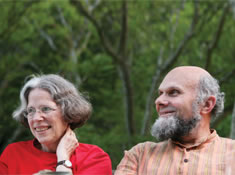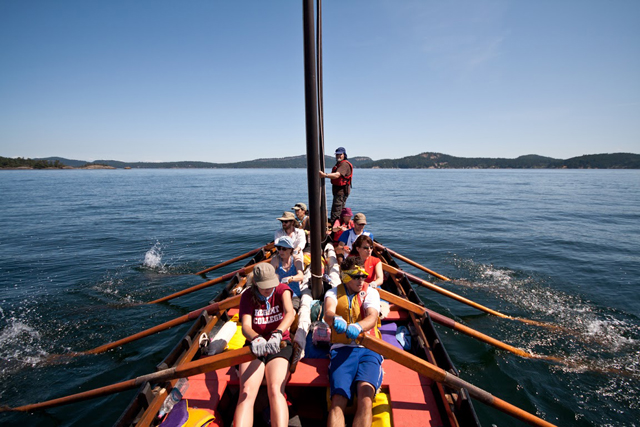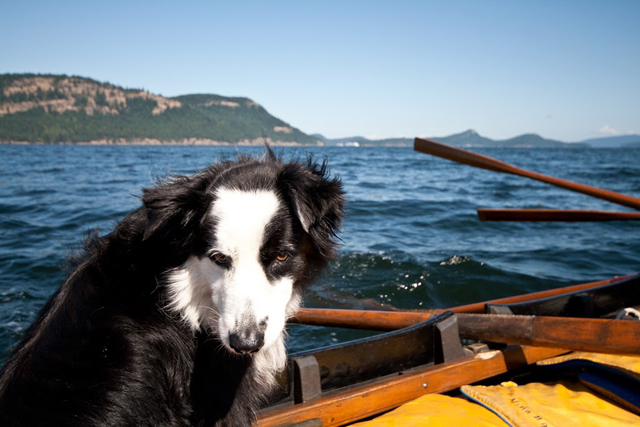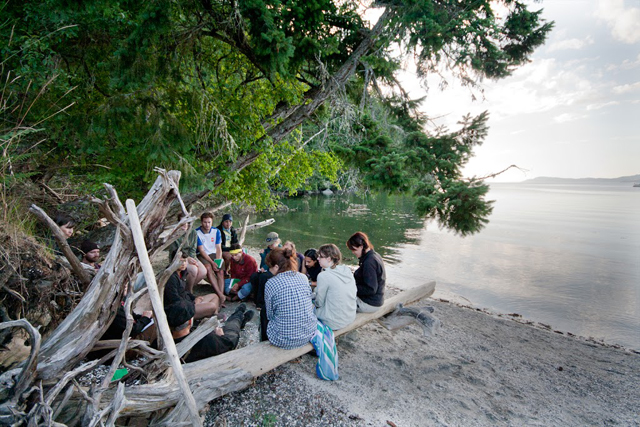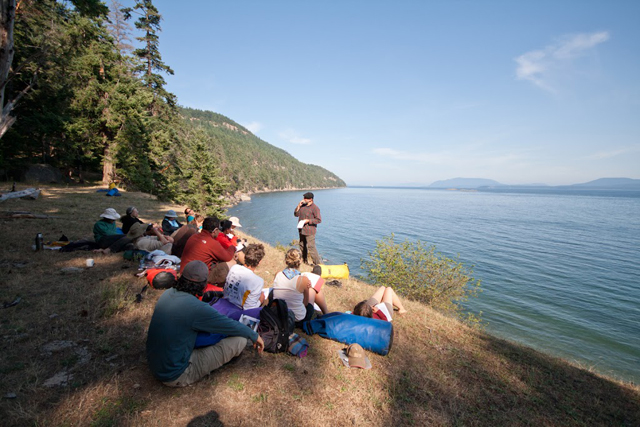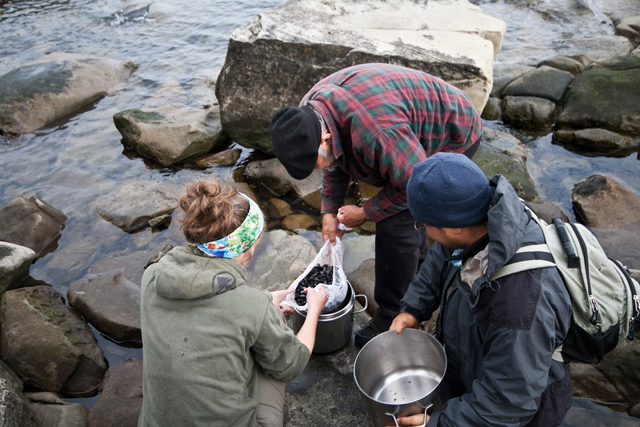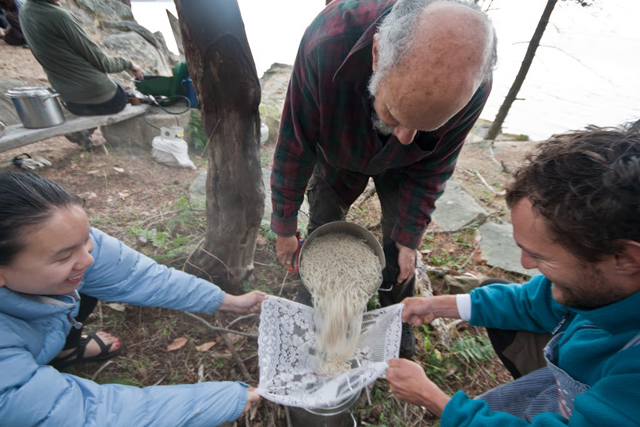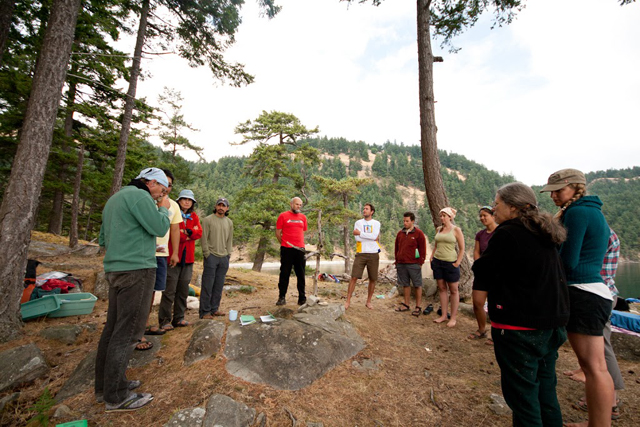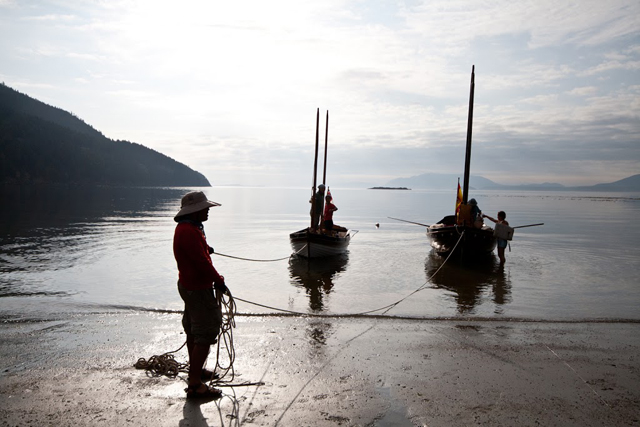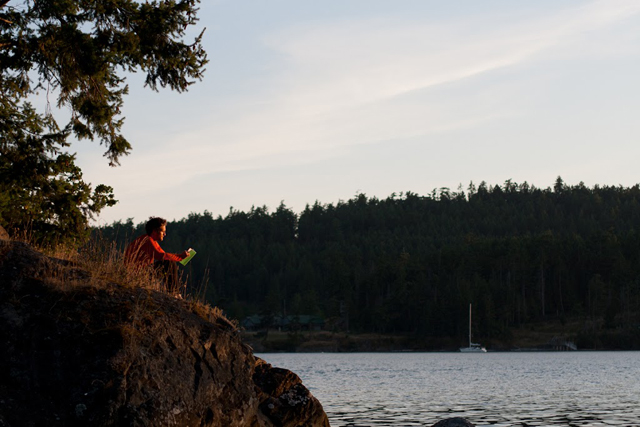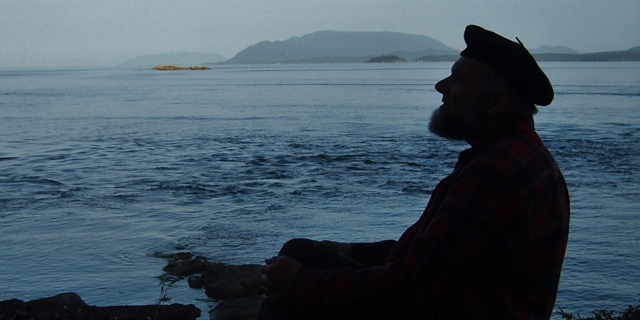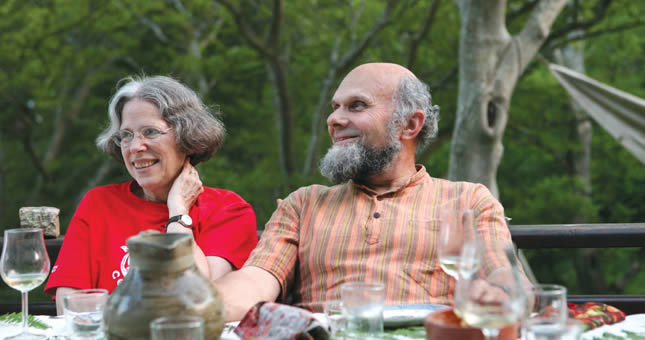
Photo by Rosie Perera
Loren and Mary Ruth Wilkinson
The Practice of Creation Care
Every summer since the 1980s, Loren and Mary Ruth Wilkinson have been taking students on an eight-day voyage in open rowing/sailing boats in the Gulf Islands as part of their Technology, Wilderness, and Creation course. The voyage is a perfect occasion for studying and reflecting on our relationship with God and creation.
Note: This interview was originally conducted for and published in the Unitive blog. The version that appears here has been edited and condensed.
MH: You say that the readings for this course are intended to "provide a chance to reflect on two opposite ideas: wilderness—the 'natural world apart from human influence,' and technology—the many ways in which we human beings, by our very nature, try to shape the earth in order to shape our wants and needs." Do you stand by those definitions and in what way?
LW: The word "wilderness" comes from the word "wild" and the word "wild" comes from the word "willed." It is those things in nature—originally beasts or animals—that were not tamed but followed not the human will but their own will. One of the things we quickly experience in the boats is that the sea and the weather don’t always do what we want them to do. Just the experience of being in a boat that doesn’t allow you to override these natural cycles of weather and water is a way of experiencing wilderness at a fairly profound level.
MH: Do you stand by your definition of technology?
LW: Technology, then, is all the ways in which we human beings shape and do things in the natural world.
MRW: The experience of being in these boats is a way of looking at the historic transformation that has occurred in our human attempts to make that world which is "willed" external to us be conformed to our wishes and wills. Because we begin to see that development—that there was technology long before the modern world after all—so we respect the human capacity for technology but we think critically about the process of losing our "touch" with the natural world through this very technology.
LW: This experience is not a way of saying that technology is bad, that modern technology is bad, that motors are bad—rather that technology very quickly becomes invisible to us. We just don’t notice it, we indwell the world through it. And when you are forced into the wilderness, as we are in these boats, albeit through a different type of technology (one rather strange to us), we begin to see the whole process of shaping the world through technology in a way that is more visible and obvious to us. There is a phenomenological term, "bracketing," and we bracket certain aspects of the world in order to experience the present reality more vividly. That is exactly what happens—the boats bracket out our normal experience of modern technology and thereby enable us to see more clearly how we interact with the natural world—creation—more regularly, through tools. A sailboat is a tool after all.
MRW: It also helps to teach all of us who are in the boats that there can be a different approach to meeting our needs that doesn’t squelch or minimize the natural world, but simply uses it all—even the tides can be used for electricity for example, or the technology of wind mills and turbines, not that there aren’t some problems with those—but the uses of the natural world can come about in a way that puts who we are as humans in tune with the natural patterns of creation.
MH: Going back to the readings, you say that they are intended to focus "on the Christian doctrine of creation." How would you explain the doctrine of creation to folks who don’t know much about it?
LW: An experience like this course puts us in touch with the contingent nature of creation—it doesn’t come out of necessity, it is kind of poured out in a continual lot of unexpected gifts to us. We can come to understand it—to some extent, sort it out scientifically and historically—but the whole natural world is an astonishment, which we normally pass right by and forget the fundamental question underlying everything: why is there something rather than nothing? What is going on here anyway?
And another dimension is the astonishment of our own consciousness of creation. Animals experience creation but we seem unique in the ability to really reflect on it, to draw it up into art, to study it in science, to make it a means of worship—of thanking God for everything that is and offering it up to him.
MRW: We come to see creation as a whole long, long process in which God has been working with deep love and joy to create something that is very good. God has been working towards the Incarnation—the central act of God, coming to dwell with all he has made. That is symbolized (but more than symbolized really) in the bread and wine—that God has come to dwell with us. We want to really get that message across and live that out with our students in this course.
MH: You look quite soberly in this course at the state of the planet. If we were going to give a report card to the ecosystems of the planet that sustains us, it isn’t a very rosy picture.
LW: There is such an implicit contrast. What we are experiencing [in the course] is largely nature undisturbed. We see healthy ecosystems along the shore, healthy forests, we experience the ancient cycles of weather and tides in ways that folks rarely do. We all get the sense that things are exactly as they should be. The bird life, the seals, otters, even whales at times. We often read Psalm 104 which goes through this wonderful liturgy of creation, and being on the boats, it is just like we are right there—things are as they should be.
MH: What is the problem then?
LW: Well, it isn’t the whole picture. Especially where we camp, on the south end of Saturna Island for a few days, we are facing south towards the Strait of Georgia, which is the main connection between Western Canada and China. So every half hour, there is this sort of rumble and here, going in one direction or the other, is a tanker or container ship rumbling through, taking Canadian resources to China, or perhaps bringing cheap goods back from China to here. So in this marvelous setting with the alpenglow coming off Mount Baker to the south, you have a 1,000-foot container ship taking cheap consumer goods to Vancouver.
MRW: Yet even in Psalm 104 you have "there the ships go to and fro."
LW: Yes, so even there, this is acknowledged as part of the way humans have been doing things. Yet we are now approaching a real crisis situation, something new: the acidification of oceans. This has not had a noticeable effect—even here on our coasts—and yet we are only just now discovering it. Just as we are learning about the marvelous intertidal life, we now know just how deeply it’s threatened. All that symbolized by these massive container ships running by every thirty minutes.
MH: It’s easy to become overwhelmed by the state of the planet. I can imagine many students being upset about the state of things—I myself have been in despair at times and very upset about that. How do you navigate this with a sense of hope?
LW: There's a really easy answer. That is, the experience itself—of being outdoors, in the natural world, for the week together—is just a profound reminder that we are the recipients of this gift. It is good. We all go back with some dread and disappointment no doubt, hearing the bad news. And yet it comes in the midst of also experiencing and hearing this huge good thing going on. The course is not at all to tell folks how awful the state of the planet is, but that even in its groaning we try hard to emphasize just how wonderful life is—it is all unnecessary, all a sheer gift. That is one reason we try to cook very good food out there, for example. Food is a daily gift of creation. So in some ways, this bad news is being encountered in the midst of this huge physical, sensuous experience of good news. Life is good news! It overarches the bad news, it always does. That is the Christian story, after all.
MRW: We always like to emphasize what Wendell Berry says, "be joyful though you have considered all the facts."
LW: "Practice Resurrection." That is our message.
MH: What might you say to university students who are interested in these issues and want to know what they can do about them?
LW: They should be sure to take a walk in the natural world every day if at all possible. Just get out into nature every day.
MRW: And grow something!
And I think that is why one of our favourite places on this whole trip is the southern end of Saturna Island, looking out over the ocean and the sandy beach there. It is such a peaceful place to end this trip and the students actually take a 24-hour solo during this time. You stand on this little point looking out to the islands to the south, across to Mount Baker to the east, and there is such a sense of God’s blessing and the gift of it all. We have a picture of an altar created by students and we hold communion together there at the end of the course. It is a profound thing to share this sacrament—it pulls together the whole time of the course, all that we have learned and discovered in one another.
MH: Yes, and fitting perhaps that this consideration of wilderness, technology, and creation ends in communion.
LW: In the first instance, eating is the most obvious and regular way in which we interact with the rest of the created world—we are sustained by it, by eating it. So that’s very good news for those of us doing the eating and can appear very bad news for the thing being eaten. There is a real sense in which our life is sustained at a cost—we see this in our daily eating, if we pause long enough to reflect upon it, and we see this in the Eucharist. So there is a sense that creation itself is like the gift of food—poured out for us and given by God for our sustenance, and this giving comes at a great cost. So in the communion meal, we experience most vividly through the ordinary everyday experience of ingesting, of taking in the gifts of creation, that deeper, more profound sense that God in his love has made all this life possible. This through giving himself in Christ, but also through the giving of himself in the gifts of creation—the bread and wine are essential elements to our existence. The specific offering of Christ, remembered in the communion meal, is also remembered in a more general way in all our regular eating and taking in of the good gifts of creation.
